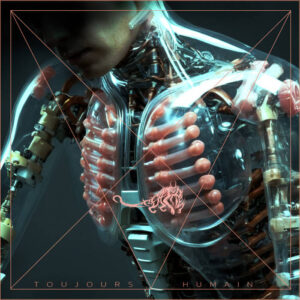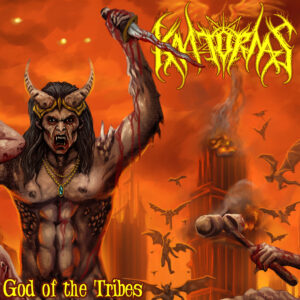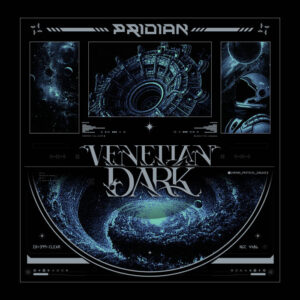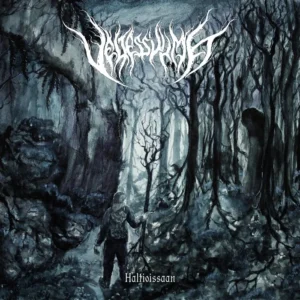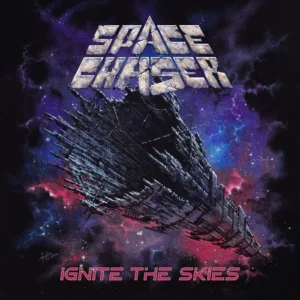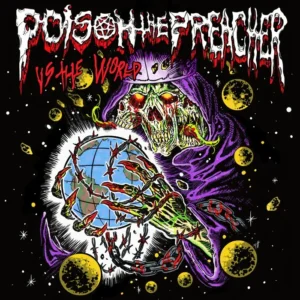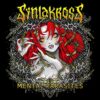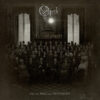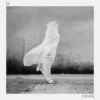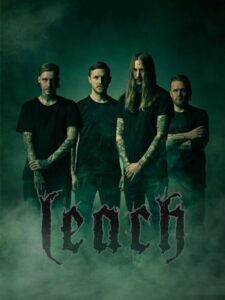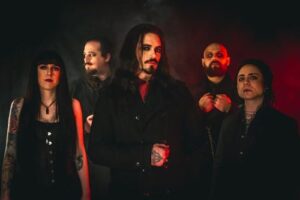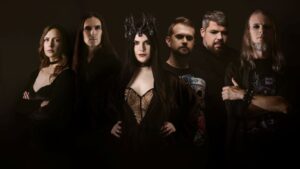ARÐ
Mark Deeks

Hey, thanks for the interview! I am doing fine, thank you
The music of Arð came about purely as a result of me wanting to be musically selfish for a change. I've worked many years as a professional musician creating music to other people's specifications. Of course I get to be creative in Winterfylleth, and love the albums we have made together, but in a band there will always be an element of compromise. For once I wanted to put something together exactly as I wanted.
Of all the different styles of music I listen to, it's the slower forms of metal that I tend to return to the most. Whether it's Mournful Congregation or Candlemass, Shape of Despair or Cult of Luna, there's nothing I enjoy more than bands who can combine slow, crushing and powerful sounds, with a great sense of melody and atmosphere.
When I first conceived the music of Arð, I didn't think it would come out as heavy as it did, and thought my love of bands like Tenhi and Kauan would be the main influence. But then I started to wonder what would happen if I combined that kind of sound with aspects of Funeral or Mourning Beloveth, where would that take me. Add into the mix my main instrument is piano, plus I'm obsessed by vocal harmonies and have worked professionally with choirs for almost 25 years, and you get the sound of Arð.
St. Cuthbert was a prominent monk in the second half of the 7th Century in the old kingdom of Northumbria. He was a hermit and a healer. He was based on the Holy Island of Lindisfarne off the north east coast of England, a location that would become synonymous with being where the Vikings first invaded England a century later.
Legend has it that Cuthbert had a premonition of his death and was worried that what happened to his remains would become the subject of division in the church, so he told his followers "I would rather you took up my bones from this place". The story goes that some years after his death his coffin was opened and they found that his body was incorrupt, and so began the cult of Cuthbert as this was taken as a sign that he had been extremely holy. When the Vikings invaded, the monks on Lindisfarne decided to leave with their most valued possessions, including the remains of Cuthbert, and spent 200 years moving him around the region from place to place. "Take Up My Bones" tells the story of some of the legends surrounding this journey.
To be totally clear, this is not a Christian record in any way. The primary goal of the lyrics of Arð is to tell tales of the history and culture of the old kingdom of Northumbria. Sure, there is a considerable Christian heritage in this region, for example with St. Cuthbert who is the central character of "Take Up My Bones", but the lyrics give a very different take on the story of Cuthbert than that which is usually presented.
Normally the followers of St. Cuthbert dutifully protecting his bones for 200 years around the region is seen as an act of extreme devotion, and Cuthbert asking his followers to "take up my bones from this place" as some sort of blessing. However, I wanted to ask whether, in fact, they had been given a curse to wander what at the time could be fairly dangerous lands, protecting a coffin. Plus, of course, monks carrying a coffin for 200 years just sounded SO doom!
The way that metal musicians represent where they are from was the subject of my PhD some years ago. Most commonly bands will take aspects of the history or mythology of their region or nation, and use them as the starting point for lyrics. Many bands will then also use the album artwork to add a visual representation either by using an old painting or a depiction of a particular landmark or landscape. It is less frequent for bands to then also have some kind of musical aspect to the representation, either by using perhaps an old melody or a traditional instrument. I find it really interesting how a huge range of metal bands from across the world have done this. However, to the best of my knowledge, no one had done so for Northumbria. As an area with a rich and varied history, and a proud people, I felt I needed to tell our tale.
I don't tend to be one to presume I can moralize on behalf of others, but I'd hope that perhaps there can be a sense of encouraging a sense of questioning, that there may be more to the stories we our told from our histories that we perhaps look more closely at rather than just accepting. Stories like that of St Cuthbert also remind us that it is those who write down or pass on our history that play a pivotal role how we understand those who went before. We always have to keep in mind that their particular viewpoint or bias is bound to have played a part in the records they kept and the stories that they told.
I must say I don't really think of the music as having a "message" as such. Its primary goal is to represent the history of Northumbria, telling stories to an audience that will almost certainly not be familiar with them. This region has a rich history and a passionate identity. That is what Arð sets out to do. If there WAS to be any message in the particular case of "Take Up My Bones", it would focus on my cynicism for religious faiths, and how I think that whilst they often might include some good stories, the conclusions drawn by followers deserve to be challenged more rigorously.
No, never. This is the music that no matter what else I listen to or get involved with, I always feel I return to. I also thought it perfectly suited the themes and atmospheres I wanted Arð to represent.
Thank you. Yes, for sure I think perhaps the fact that I spend a lot of my professional life arranging for choirs, bands and orchestras, meant that I was never just going to write a couple of guitar riffs and call it a song haha! I knew I wanted cello to play a really central role, and not just be a token embellishment, so I think the multiple layers of cello is probably pretty unusual in doom. And, of course, there doesn't tend to be a primary role for piano in a lot of doom bands as there is in parts of the Arð album either, and that's got a character all of its own too.
Thanks for the kind words. This was always going to be a central element for me as, simply put, I'm OBSESSED by vocal harmonies (and have run choirs professionally for 25 years). Of course having a large number of baritone voices using the kinds of harmonies I wanted to use perfectly fitted the theme of this album with the tales of monks etc., but this will always be an important part of the Arð sound regardless of the lyrical theme.
I write everything on piano as a starting point – it's what I know best, and what allows me to write the easiest without having to think. I almost always write by recording spontaneous improvisations – sometimes that are only seconds long, occasionally 10-20 minutes. I try not to put too much conscious thought into them, work on them or try to modify them in any way. I end up with a folder of maybe 40-60 improvisations. Then the job is to start going back through them and seeing what stands out, which could be anything from a few notes to a whole "section".
Only then will I start working on developing the ideas and piecing together what starts to take shape. The vocals and lyrics ALWAYS come last.
Whilst as I mentioned earlier the music always comes before the lyrics when I am writing, I knew what the theme of the album was going to be, and I knew that I wanted Arð to be based in the history of Northumbria. Therefore, letting my passion for big vocal harmonies and their ability to create old monastic atmospheres worked perfectly. I also wanted to use some church pipe organ sounds for the same reasons, and of course as a nod to one of the finest doom bands Skepticism!
I don't know if it taught me anything more profound than sometimes it's good to do something just for yourself sometimes. An authenticity to both my region and my musical soul was the priority, and the initial reaction from others suggests that people can feel that soul, even when they are from elsewhere. Perhaps it taps into how we all feel about where we come from?
Well just to be clear it was Chris Fielding who had the job of producing the record and capturing all the multiple layers so that they all could be heard clearly and play their part, which he did a fantastic job of. It was an intense week of recording, as there were a lot of layers to put down, and I guess it helped that I had a lot of the lines notated out to make sure I kept myself right for what needed doing, especially with the huge amount of vocal harmonies and multiple cello lines. Also, I had recorded the final versions of all the piano and keyboard tracks in advance at my home studio in order to save time, which was just as well as we would never have got all those done in a week too!
It feels very unusual for me to say it, knowing how much of a perfectionist I am with every other musical project I work on, but yes the album does exactly what I wanted it to, and I'm totally satisfied with it. I find it very difficult to listen to any of the tracks in isolation, as for me it needs to heard as a whole to really feel the journey you refer to. It's music that rewards patience for sure, I think. The final track, "Only Three Shall Know" is the one that deliberately has the most soaring melody on the album, and I hope that the attention to detail and emotions that were poured into it leave the listener with a sort of sense of euphoria as it ends.
I think it's fair to say that Arð was primarily conceived with the studio in mind where I could let my love of adding multiple layers run wild. However, I have also had in the back of my mind several different ways that this music could be reinterpreted in the live environment, either in
full band format or in a more stripped back acoustic way. There's no intention currently to do any kind of extensive touring, but if the opportunity presents itself in a venue where there is an appropriate atmosphere and setting, then I think there is the possibility for some cool one-offs for sure.
All the best, thank you Lior

More results...

